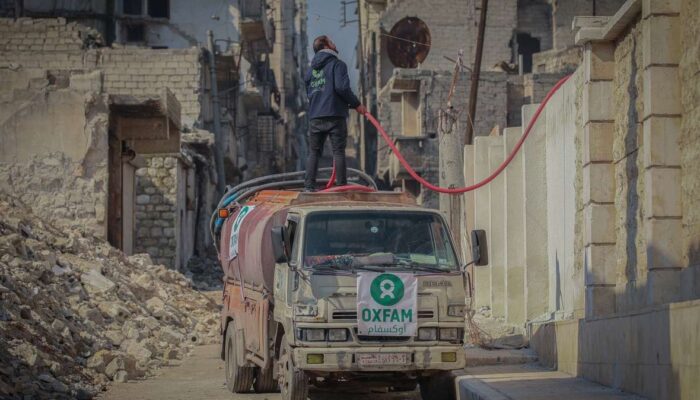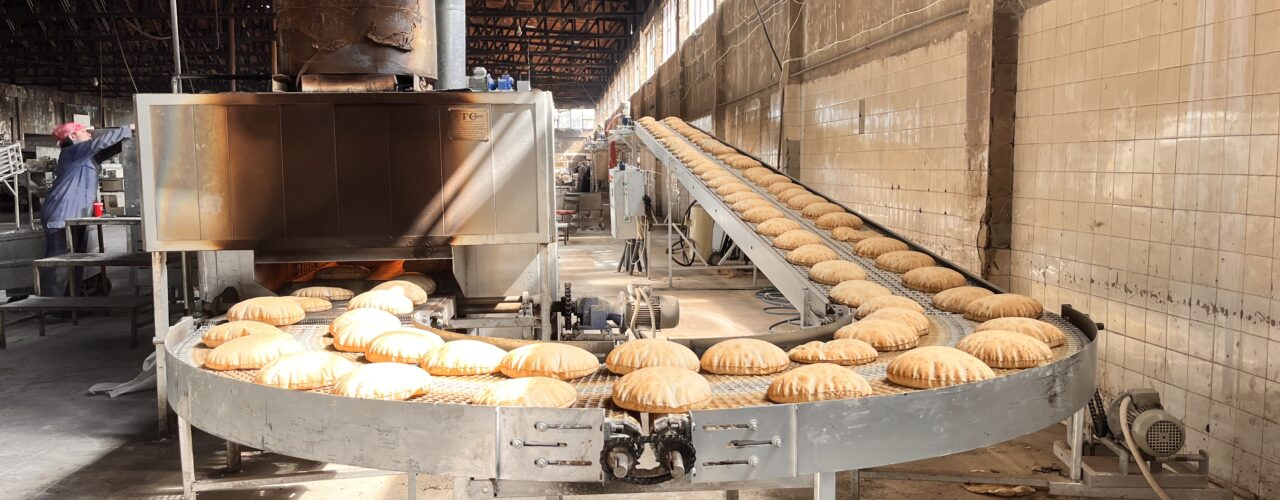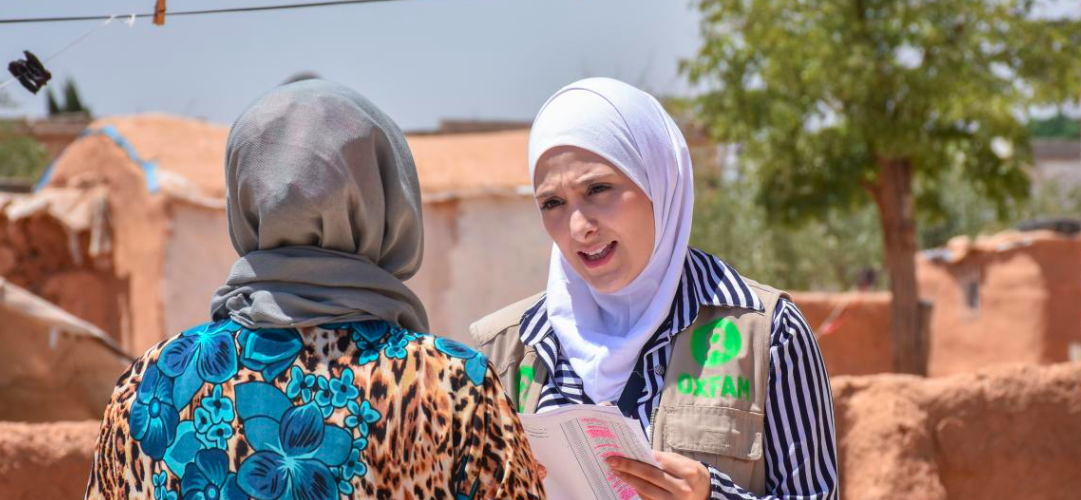16.7 million people across Syria are expected to need humanitarian assistance

Can you tell something about the work you are doing in Syria?
When I arrived in September, I was expecting to travel from Damascus to our two other offices in Aleppo and Deir ez-Zor. However, due to the constantly changing security situation, this was not possible until now.
Within Oxfam in Syria, my role is to advise on our partnership strategy, strengthen our ways of working with partner organisations and expand our partnership portfolio. As such, my work can be divided in two different aspects. The first one is more inward-looking: together with my colleagues, we’re exploring and discussing what our added value is within the Syrian context and how we can be a good and reliable partner to Syrian civil society organisations. The second one is more outward-looking: building and shaping new relationships and collaborations with the aim of providing humanitarian aid to as many Syrians in need as possible in a timely and efficient way.
What is Oxfam doing in Syria?
Oxfam in Syria is responding to humanitarian crises and extreme levels of inequality and vulnerability. Since 2013, we have worked to get clean water to people affected by the conflict. We do this by trucking water, equipping and maintaining water wells and stations, and using renewable energy to power them. We also repair damaged sections of the water and sewerage network so that more families can access safe, clean water in their homes. We support bakeries to increase their production capacity, through technical expertise and the provision and installation of generators, as bread is a vital part of Syrian people’s diet. In addition to responding to emergencies, for example in the earthquake affected regions, we are also increasingly investing in early recovery and livelihood opportunities, for example through business grants, cash assistance and the provision of agricultural inputs to farmers. We also use these activities as entry point to increase our work on gender and protection, for example through establishing safe and inclusive spaces where gender norms and how to challenge those, and protection risks can be expressed and addressed.

How is the situation in the country now?
Today, food and electricity are the highest needs raised by vulnerable Syrians. The cost of living has risen by approximately 60% in 2023 and due to high inflation and currency devaluation, many people are struggling to make ends meet. In addition, the shortages in energy and electricity are impacting people’s access to water and food. We did a recent survey in 8 governorates, which found that, in the areas of Syria where Oxfam works, thousands of people live with less than two hours of public electricity per day. In practice, this means that shop owners can’t run their businesses, people can’t shower with warm water despite freezing winter temperatures and farmers can’t run their irrigation equipment to water the land. In addition, running water schemes without minimum secured levels of electricity is an impossible task and many families tell us that, as a result, they receive much less water than before the start of the conflict.
The cost of living has risen by approximately 60% in 2023 and due to high inflation and currency devaluation, many people are struggling to make ends meet.
Do you see and feel that the attention for Syria after the earthquake is getting less?
Yes. With everything going on in the region and the hostilities within Syria continuing, albeit with reduced intensity, we see Syria being deprioritized by many donors and this also means that the available funding to respond is reducing. For example, in December, the World Food Programme announced it is further cutting food distributions due to budget constraints. However, in 2024, approximately 16.7 million people are expected to need humanitarian assistance across Syria* and poverty and reliance on humanitarian assistance are only increasing in the light of the high inflation and increases in prices.
*This estimated number is based on the UN OCHA 2024 humanitarian needs overview for Syria (Syrian Arab Republic: 2024 Humanitarian Needs Overview (December 2023)
In 2024, approximately 16.7 million people across Syria are expected to need humanitarian assistance. At the same time poverty and reliance on humanitarian assistance are only increasing in the light of the high inflation and increases in prices.
What is the cause of the lack of food?
In recent years, Syria has experienced a series of shocks, which have affected people’s access to food. These include, for example, the destruction of infrastructure, forced displacement, a war economy, the consequences of the conflict in Ukraine and the unintended consequences of sanctions implemented against the country. The conflict has disrupted the food supply chain and decreased agricultural production. In some locations, land is still contaminated by landmines. In addition, due to shortages of fuel, prices for harvesting and transporting crops have increased, which has led some farmers to decide not to harvest their crops. In other words: within the Syrian context, the issue is not so much that food is not available, but that a majority of Syrians cannot afford the available food due to increased prices.
How is it to work in such a difficult context?
I mostly feel privileged to get the opportunity to be part of Oxfam’s team in Syria for nearly 8 months. Despite the ongoing conflict, life goes on. Damascus is a very beautiful city, and I spent my weekends going to restaurants, the hammam or exploring the beautiful old city. Within the city, I can walk around freely. On the other hand, when leaving the city for project visits, we drive by neighbourhoods that have been completely destroyed or flattened, which often make me go silent and I then feel very small for a while. It helps to have colleagues and friends here that have made me feel very welcome, to talk about it or distract each other.
It often makes me go silent and I then feel very small for a while.
Did you ever feel unsafe?
Not really. Since I arrived in September, there have been a number of Israeli airstrikes targeting Damascus airports. This is not something new, and has been ongoing before the hostilities in October. Regardless, the sound of explosions is not something I’m used to – but our security team closely monitors the situation in the country and the region, and I’m becoming very good at following security instructions.
What is the impact from the situation in Gaza on your work?
In the whole region, including Syria, tension was very high and people were nervous of what was going to happen next. Damascus went quiet, as if people were holding their breath in waiting to see if the violence would spill over to other countries. Oxfam has an office and more than 30 colleagues in Gaza, so we have been, and still are, incredibly worried about their safety and wellbeing. Hearing their voices and stories has been extremely rough for many of us, especially because it feels like there is so little we can do for them. Within the Syrian context, however, the situation in Gaza has not had a big impact of the continuation of activities.
Oxfam has an office and more than 30 colleagues in Gaza, so we have been, and still are, incredibly worried about their safety and wellbeing.
How do you see the importance of working with local organisations?
Compared to other countries where Oxfam works, in Syria we have less tradition of working with partners due to various complicating factors. For example, setting up new partnerships with local or national Syrian NGOs often requires approvals from authorities. This process can take a lot of time, while we need to be able to respond quickly when the situation on the ground changes. Regardless, while local and national NGOs often play a key role as first responders when disaster strikes, the reality is that the humanitarian system continues to be centralized around international actors. By increasingly supporting the leadership of aid providers that are as close as possible, both geographically and culturally, to communities affected by crises, we try to strengthen a locally-led system. In doing so, we are trying to build new partnerships as well as better engage our existing partner organisation in the planning, delivery and accountability of humanitarian aid.

What do you think that Oxfam’s added value is?
Oxfam’s added value will vary across countries, but specifically looking at Syria, I think these include, for example, our technical expertise on water, sanitation, hygiene and public health. For example, after the earthquake hit Northern Syria in February, Oxfam managed to deliver 674.000 litres through water trucking, reaching more than forty thousand people in just the first ten days. In addition, we use our expertise and experience to engage with high-level decision-makers and stakeholders at the global level to lobby and advocate for human rights to be respected and international support to be mobilised, for example at the annual Brussels Conference on Syria. In doing so, we are able to create space for conflict-affected Syrians to speak out so that they have a say in the decisions that affect their lives.
What is next?
It’s currently winter in Syria and, especially at night, the temperature is dropping. Due to the challenges around electricity, many Syrians can’t heat up their homes. It’s frustrating to see humanitarian needs only increasing while available funds are decreasing. While basic humanitarian assistance continues to save lives, Oxfam in Syria is increasingly trying to build early recovery into our humanitarian programming so that people don’t stay reliant on humanitarian aid and can instead create sustainable livelihoods and generate an income.
Oxfam in Syria
More information about Oxfam’s work in Syria? Click here.
Read more about Elsa van Zoest here.
Author: Marianne Sijtsma
Date: 23-01-2024
